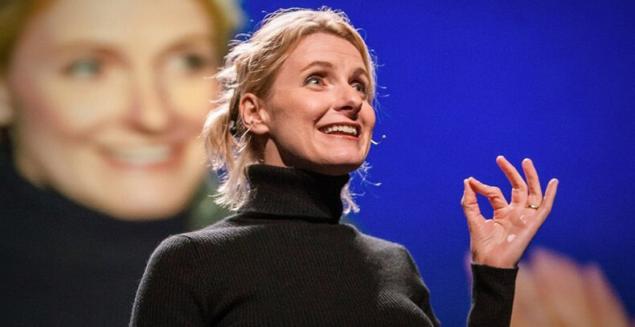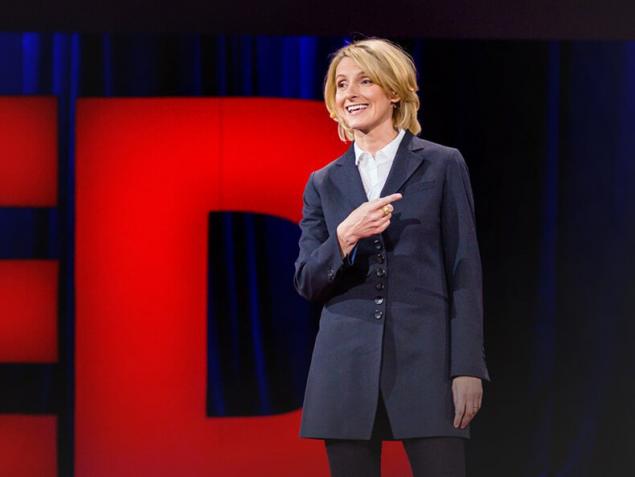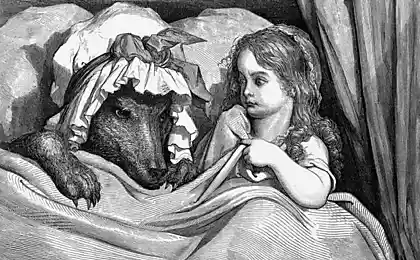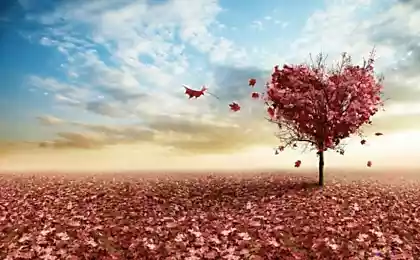1652
Elizabeth Gilber: What kills the creative people of the past 500 years
In 2009, writer Elizabeth Gilbert gave a lecture at the TED conference. We publish her transcript.
I am a writer. Writing a book - my profession, but, of course, is much more than just a profession. I infinitely love their job and do not expect ever that something will change in the future. But recently, there was something special in my life and in my career that made me rethink my relationship with my work.

The fact that I have recently published a book "Eat, Pray, Love." It is very unlike all my previous works. She became crazy, a sensational international bestseller. As a result, now, wherever I went, people treat me like a leper. Really. For example, they come to me, excited and asked, "Are not you afraid that you will never be able to write something better? What has never published a book, which would be just as important to people? Never? Never? »
It is encouraging, is not it? But it would be much worse if I did not remember how 20 years ago, when I was a teenager and first started to talk aloud, what I want to be a writer, I was met by a reaction of the same kind. People say, "Are not you afraid that you will never reach success? Are not you afraid that the humiliating position of rejection will kill you? What are you going to work all my life, but in the end nothing happens, and you're dead, buried under the unfulfilled dreams, overflowing with bitterness of failure and frustration? "And so on.
The short answer to all these questions - yes. Of course I'm afraid of it. And always afraid. And I am afraid of so many more things that people do not realize. For example, algae and other horror. But when it comes to writing, there is a problem, which recently began to think and wonder why this is the case. It is rational and logical to be afraid of the work for which people are?
You know, there is something special about the creative people that seems to makes us very concerned about their mental health, which can not be found in respect of other classes. For example, my father was a chemical engineer. I do not recall a single case in the entire forty years of his career, when someone asked him if he was afraid to be a chemical engineer: "This activity does not torment you? All Do you do it? "Never been. Admittedly, the chemical engineers in general, for all the years of its existence, did not deserve the reputation of maniacs who drink spirits and are prone to depression.
All creative people seem firmly established reputation mentally unstable creatures.
We, writers, have a reputation of that kind. And not just writers. All creative people seem firmly established reputation mentally unstable creatures. It is enough to look at the long record of the death of brilliant creative people in just one of the twentieth century, those who died young, and often - as a result of suicide. And even those who have not committed suicide, literally, were finally expelled their gift.
Norman Mailer before his death said: "Each of my books slowly killing me." It is an unusual statement on the work of his life. But we do not even flinch when we hear something like that, because we have heard it a hundred times and have already realized and accepted the idea that creativity and suffering are somehow interconnected, and art in the end always leads to the flour.
The question I want to ask you today - you will all agree with this idea? Do you agree? Because it looks like he agree or close to that. And I do not agree with this assumption. I think that this is terrible and dangerous. And I do not want this attitude to proceed to the next century. I think it would be better for us to inspire great minds to live as long as possible.
I know for myself that it would be very dangerous to walk on this dark road, taking into account all the circumstances of my career.
I'm pretty young, I'm only 40. I'm still able to work, perhaps years, 40. And it is extremely likely that anything I write from this point on, will be judged in a world where one is already out of my book, which was so frightening success. I tell you straight - because here there was so trusting atmosphere - it is very likely that my greatest success is behind us. Lord, what a thought! Just this kind of thought and leads people drinking at nine o'clock in the morning. And I do not want to. I prefer to deal with the case, which I like.
However, the question arises - how? And after much thought about how I had to work hard to continue to write, I came to the conclusion that should create some protective psychological construct. What do I need to find some acceptable distance between himself as a man of writing - and my very natural fear of what the reaction might cause my work from now
. And I was looking for a role model for this. And I look narrowly at different times in human history and the different civilizations, to make sure that someone came to its decision wiser than we are. On the problem of how to help creative people to overcome the inherent emotional risks of creative abilities.
And my search led me to the Ancient Rome and Ancient Greece. Now my idea to make a loop in time.
The ancient Greeks and Romans believed that creativity is a general property of the person. People believed that creativity - this is the spirit of the divine and the satellite, and that they come to a man from the distant and unknown sources for unclear reasons unknown. The Greeks called these divine spirits "demons».
Socrates believed that he had a demon, who broadcast his wisdom from afar. The Romans had a similar idea, but they called it the "free expression of the creative genius." And it's great, because the Romans did not think that a genius - is some gifted individual. They believed that a genius - a kind of magic essence, lived, literally, in the walls of the house of the creator, a kind of Dobby, who came and invisibly helped the artist with his work, the results of this work formed
. The Romans thought that the genius - is some gifted individual. They believed that a genius - a kind of magic essence, lived, literally, in the walls of the house of the creator, a kind of Dobby, who came and invisibly helped the artist with his work, the results of this work formed
. Delightfully - this is the distance of which I spoke, and I was looking for myself - the psychological structure, designed to protect you from the results of your work. And all because I understand how it works, right? Creators of antiquity were protected from all sorts of things, such as narcissism. If your work was excellent, you could not fully take on the laurels of its creation. Everyone knew that you helped a genius. If your job was bad, everyone knew that you are a genius, crippled. And that is how western people thought of creative abilities for a long time.
And then came the Renaissance, and everything changed. A new idea that the individual should be at the center of the universe, the gods above, and miracles, and there is no more space mystical beings who hear the call of the divine and write under his dictation. Thus began a rational humanism. And people began to think that creativity originates in man. For the first time since the beginning of history, we heard about this or that person began to say, "he's a genius," rather than "he has a genius».
And I can tell you that it was a huge mistake. See, it allowed people to think that he or she is a vessel, source of all divine, creative, unknown, mysterious, that is too much responsibility for the fragile human psyche. I would like to ask that person to swallow the sun. This approach distorts the ego and creates all these crazy expectations from the results of work of a creative person. And I think that's a cargo of such an attitude of creative people killed over the past 500 years.
And if this is true (and I believe that this is the case) the question is, what next? Can we do otherwise? Maybe we should go back to the old perception of the relationship between man and the mystery of creation. Maybe not. Maybe we can not erase all the 500 years of rational humanistic approach one vosemnadtsatiminutnoy speech. And in the audience certainly there are people who suffer serious scientific doubt on the existence in general, fairies who follow the man and his work magic showered with pollen and things like that. I'm not going to convince you of that.
But the question that I would like to ask - and why not? Why do not you think so? After all, it gives almost more sense than any of the other concepts known to me as an explanation for the mad capriciousness of the creative process. The process, which (as anyone knows who has ever tried to create, that is, each of us) is not always rational. And sometimes even seem paranormal.
Recently, I met a wonderful American poet Ruth Stone. She is now 90 and she was a poet all his life. She told me that she grew up in rural Virginia, and while working in the fields, heard and felt poetry, come to it from nature. It was like a thunderstorm air that rolls up from the depths of the landscape. And she felt this approach, because the earth shook under our feet.
And she knew exactly what to do - "to run at breakneck speed." And she ran into the house, where it overtook the poem, and it was necessary to quickly find a paper and pencil, to have time to write down what erupted, in time to catch it. And Ruth, it was not sufficiently prompt. I do not have time to time, and the poem is rolled through it and disappeared over the horizon in search of another poet.
And at other times (I'll never forget it), she said, there were moments when she had almost missed his poem. And then she ran into the house and searched the paper and the poem passes through her. Ruth took a pencil at this point, and then a feeling that she could grasp this poem his other hand to catch it by the tail and return back to the body, while she tried to manage to capture the poem on paper. And in such cases, the poem came out perfect, but written in advance backwards.
When I heard this, I thought: "It is amazing, I write in the same way»
. This is not all my creative process, I'm not an endless source of inspiration. I'm a mule, and the way in which I go, is that I have to wake up at about the same time every day and work hard. But even I with all my stubbornness, faced with such a phenomenon. As I think many of you. Even the idea came to me from an unknown source that I find it difficult to explain clearly. What is the source? And as we all work with the same source and it does not lose reason, and even better - to keep it as long as possible
? Creators of antiquity were protected from all sorts of things, such as narcissism. If your work was excellent, you could not fully take on the laurels of its creation. Everyone knew that you helped a genius. If your job was bad, everyone knew that you are a genius, crippled.
The best example for me served as Tom Waits, who I had the opportunity to interview on behalf of a magazine a few years ago. We talked about it, and yet Tom most of his life literally embodied the artist torn by doubts, trying to gain control over all these uncontrollable creative impulses that seem to belong to himself.
Then he has got older and calmer.
One day he was driving down the highway in Los Angeles, and suddenly heard a tiny fragment of the melody. Detail came to him, as usual, elusive and seductive, and Tom wanted to catch this piece, but I could not. He had no pen, no paper, no recording device,
And he began to worry: "I forget it now, and the memory will haunt me forever. I'm not good enough, I can not do it. " And instead of panic, he suddenly stopped, looked at the sky and said: "Sorry, you do not see that I'm driving? Does it look like I can write this song now? If you are really so necessary to come to light, come in a more opportune moment when I can take care of you. Otherwise, go bother somebody else today. Go to Leonard Cohen. »
And all his creative life changed after that. Do not work - the work was still unclear and difficult. But the process itself. Severe anxiety associated with it, passed as soon as he learned of the genius himself, let him go, where this genius come.

When I heard this story, she began to move something and in my way of working, and once I have it saved. When I wrote "Eat Pray Love", I fell into the kind of despair in which we all fall into when working on something that does not work. You begin to think that it's a disaster, it would be the worst of written books. Not just bad, but the worst.
And I began to think I should just give it up. But then I remembered Tom talking to the air and tried to do the same. I looked up from the manuscript and addressed the comments empty corner of the room. I said loudly, "Look, you and I both know that if this book is not a masterpiece, it is not absolutely my fault, right? Because I, as you see, have put all of myself into it. And the more I can not offer. So if you want it to be better, maybe you just need to make a contribution to the common cause. OK. But if you do not want, then to hell with you. I'm going to write anyway, because that's my job. I just wanted to publicly declare that I am a part of the work done. »
Because ... In the end, a century ago in the deserts of North Africa, people gathered and staged dance under the moon and the music lasted hours and hours, until dawn. And they were marvelous, because the dancers were professionals. They were beautiful, right?
But sometimes, very rarely, there was something amazing, and one of them suddenly became exceptional speakers. And I know that you understand what I mean, because you have seen such a performance in my life. As if time has stopped, and the dancer stepped into the unknown, into the portal, and although he did not do anything new, anything that he has not done for 1,000 nights before, everything suddenly shone. Suddenly he ceased to be just a man. He lit the fire of the divine.
And when that happens, people know it, and called it by name. They have joined hands together, and began to sing: "Allah, Allah, Allah, God, God, God." It's God. An interesting historical note. When Mura invaded southern Spain, they brought with them the custom. Over time, the pronunciation changed from "Allah, Allah, Allah" to "Ole, Ole, Ole».
And that's what you hear in bullfights and flamenco dancing in Spain, when a performer is doing something impossible and incredible. "Allah, ole, ole, Allah, amazingly, bravo." When a person does something incomprehensible - the radiance of God. And it's wonderful, because we need it.
But a curious thing happens the next morning, when he wakes up and discovers the dancer that he is no longer a spark of God, that he is only a man whose knees hurt, and may never rise to such heights. And, perhaps, no one will remember the name of God when he dances. And then what to do the rest of his life?
It's hard. This is one of the most difficult confessions in the creative life. But, perhaps, such things would not be so painful if you do not believe from the outset that the most amazing and magical in us comes from ourselves. What it is given to us in debt from some unimaginable source at some time in your life. And that will be transferred to others in need, when you have finished their work. And, you know, if you think so, it changes everything.
I'm beginning to think so. And I think so the past few months while working on his new book, which will be published soon. Its output is filled Beyond Expectation on the background of my former frightening success.
And all that I say to myself, when I get nervous about it - is, "Hey, do not worry. Do not be upset. Just do your job. Continue to do our part, whatever it was. If your part of the dance - dance. If the divine, spontaneous genius that accompanies you, you decide to highlight their presence, just for a brief moment, then - "Ole!" And if not - keep on dancing. And "Ole" for you, anyway. " I believe in it, and I feel that we all have to learn this attitude. "Ole", in any case, because you have enough perseverance and love to continue to do their job.
I am a writer. Writing a book - my profession, but, of course, is much more than just a profession. I infinitely love their job and do not expect ever that something will change in the future. But recently, there was something special in my life and in my career that made me rethink my relationship with my work.

The fact that I have recently published a book "Eat, Pray, Love." It is very unlike all my previous works. She became crazy, a sensational international bestseller. As a result, now, wherever I went, people treat me like a leper. Really. For example, they come to me, excited and asked, "Are not you afraid that you will never be able to write something better? What has never published a book, which would be just as important to people? Never? Never? »
It is encouraging, is not it? But it would be much worse if I did not remember how 20 years ago, when I was a teenager and first started to talk aloud, what I want to be a writer, I was met by a reaction of the same kind. People say, "Are not you afraid that you will never reach success? Are not you afraid that the humiliating position of rejection will kill you? What are you going to work all my life, but in the end nothing happens, and you're dead, buried under the unfulfilled dreams, overflowing with bitterness of failure and frustration? "And so on.
The short answer to all these questions - yes. Of course I'm afraid of it. And always afraid. And I am afraid of so many more things that people do not realize. For example, algae and other horror. But when it comes to writing, there is a problem, which recently began to think and wonder why this is the case. It is rational and logical to be afraid of the work for which people are?
You know, there is something special about the creative people that seems to makes us very concerned about their mental health, which can not be found in respect of other classes. For example, my father was a chemical engineer. I do not recall a single case in the entire forty years of his career, when someone asked him if he was afraid to be a chemical engineer: "This activity does not torment you? All Do you do it? "Never been. Admittedly, the chemical engineers in general, for all the years of its existence, did not deserve the reputation of maniacs who drink spirits and are prone to depression.
All creative people seem firmly established reputation mentally unstable creatures.
We, writers, have a reputation of that kind. And not just writers. All creative people seem firmly established reputation mentally unstable creatures. It is enough to look at the long record of the death of brilliant creative people in just one of the twentieth century, those who died young, and often - as a result of suicide. And even those who have not committed suicide, literally, were finally expelled their gift.
Norman Mailer before his death said: "Each of my books slowly killing me." It is an unusual statement on the work of his life. But we do not even flinch when we hear something like that, because we have heard it a hundred times and have already realized and accepted the idea that creativity and suffering are somehow interconnected, and art in the end always leads to the flour.
The question I want to ask you today - you will all agree with this idea? Do you agree? Because it looks like he agree or close to that. And I do not agree with this assumption. I think that this is terrible and dangerous. And I do not want this attitude to proceed to the next century. I think it would be better for us to inspire great minds to live as long as possible.
I know for myself that it would be very dangerous to walk on this dark road, taking into account all the circumstances of my career.
I'm pretty young, I'm only 40. I'm still able to work, perhaps years, 40. And it is extremely likely that anything I write from this point on, will be judged in a world where one is already out of my book, which was so frightening success. I tell you straight - because here there was so trusting atmosphere - it is very likely that my greatest success is behind us. Lord, what a thought! Just this kind of thought and leads people drinking at nine o'clock in the morning. And I do not want to. I prefer to deal with the case, which I like.
However, the question arises - how? And after much thought about how I had to work hard to continue to write, I came to the conclusion that should create some protective psychological construct. What do I need to find some acceptable distance between himself as a man of writing - and my very natural fear of what the reaction might cause my work from now
. And I was looking for a role model for this. And I look narrowly at different times in human history and the different civilizations, to make sure that someone came to its decision wiser than we are. On the problem of how to help creative people to overcome the inherent emotional risks of creative abilities.
And my search led me to the Ancient Rome and Ancient Greece. Now my idea to make a loop in time.
The ancient Greeks and Romans believed that creativity is a general property of the person. People believed that creativity - this is the spirit of the divine and the satellite, and that they come to a man from the distant and unknown sources for unclear reasons unknown. The Greeks called these divine spirits "demons».
Socrates believed that he had a demon, who broadcast his wisdom from afar. The Romans had a similar idea, but they called it the "free expression of the creative genius." And it's great, because the Romans did not think that a genius - is some gifted individual. They believed that a genius - a kind of magic essence, lived, literally, in the walls of the house of the creator, a kind of Dobby, who came and invisibly helped the artist with his work, the results of this work formed
. The Romans thought that the genius - is some gifted individual. They believed that a genius - a kind of magic essence, lived, literally, in the walls of the house of the creator, a kind of Dobby, who came and invisibly helped the artist with his work, the results of this work formed
. Delightfully - this is the distance of which I spoke, and I was looking for myself - the psychological structure, designed to protect you from the results of your work. And all because I understand how it works, right? Creators of antiquity were protected from all sorts of things, such as narcissism. If your work was excellent, you could not fully take on the laurels of its creation. Everyone knew that you helped a genius. If your job was bad, everyone knew that you are a genius, crippled. And that is how western people thought of creative abilities for a long time.
And then came the Renaissance, and everything changed. A new idea that the individual should be at the center of the universe, the gods above, and miracles, and there is no more space mystical beings who hear the call of the divine and write under his dictation. Thus began a rational humanism. And people began to think that creativity originates in man. For the first time since the beginning of history, we heard about this or that person began to say, "he's a genius," rather than "he has a genius».
And I can tell you that it was a huge mistake. See, it allowed people to think that he or she is a vessel, source of all divine, creative, unknown, mysterious, that is too much responsibility for the fragile human psyche. I would like to ask that person to swallow the sun. This approach distorts the ego and creates all these crazy expectations from the results of work of a creative person. And I think that's a cargo of such an attitude of creative people killed over the past 500 years.
And if this is true (and I believe that this is the case) the question is, what next? Can we do otherwise? Maybe we should go back to the old perception of the relationship between man and the mystery of creation. Maybe not. Maybe we can not erase all the 500 years of rational humanistic approach one vosemnadtsatiminutnoy speech. And in the audience certainly there are people who suffer serious scientific doubt on the existence in general, fairies who follow the man and his work magic showered with pollen and things like that. I'm not going to convince you of that.
But the question that I would like to ask - and why not? Why do not you think so? After all, it gives almost more sense than any of the other concepts known to me as an explanation for the mad capriciousness of the creative process. The process, which (as anyone knows who has ever tried to create, that is, each of us) is not always rational. And sometimes even seem paranormal.
Recently, I met a wonderful American poet Ruth Stone. She is now 90 and she was a poet all his life. She told me that she grew up in rural Virginia, and while working in the fields, heard and felt poetry, come to it from nature. It was like a thunderstorm air that rolls up from the depths of the landscape. And she felt this approach, because the earth shook under our feet.
And she knew exactly what to do - "to run at breakneck speed." And she ran into the house, where it overtook the poem, and it was necessary to quickly find a paper and pencil, to have time to write down what erupted, in time to catch it. And Ruth, it was not sufficiently prompt. I do not have time to time, and the poem is rolled through it and disappeared over the horizon in search of another poet.
And at other times (I'll never forget it), she said, there were moments when she had almost missed his poem. And then she ran into the house and searched the paper and the poem passes through her. Ruth took a pencil at this point, and then a feeling that she could grasp this poem his other hand to catch it by the tail and return back to the body, while she tried to manage to capture the poem on paper. And in such cases, the poem came out perfect, but written in advance backwards.
When I heard this, I thought: "It is amazing, I write in the same way»
. This is not all my creative process, I'm not an endless source of inspiration. I'm a mule, and the way in which I go, is that I have to wake up at about the same time every day and work hard. But even I with all my stubbornness, faced with such a phenomenon. As I think many of you. Even the idea came to me from an unknown source that I find it difficult to explain clearly. What is the source? And as we all work with the same source and it does not lose reason, and even better - to keep it as long as possible
? Creators of antiquity were protected from all sorts of things, such as narcissism. If your work was excellent, you could not fully take on the laurels of its creation. Everyone knew that you helped a genius. If your job was bad, everyone knew that you are a genius, crippled.
The best example for me served as Tom Waits, who I had the opportunity to interview on behalf of a magazine a few years ago. We talked about it, and yet Tom most of his life literally embodied the artist torn by doubts, trying to gain control over all these uncontrollable creative impulses that seem to belong to himself.
Then he has got older and calmer.
One day he was driving down the highway in Los Angeles, and suddenly heard a tiny fragment of the melody. Detail came to him, as usual, elusive and seductive, and Tom wanted to catch this piece, but I could not. He had no pen, no paper, no recording device,
And he began to worry: "I forget it now, and the memory will haunt me forever. I'm not good enough, I can not do it. " And instead of panic, he suddenly stopped, looked at the sky and said: "Sorry, you do not see that I'm driving? Does it look like I can write this song now? If you are really so necessary to come to light, come in a more opportune moment when I can take care of you. Otherwise, go bother somebody else today. Go to Leonard Cohen. »
And all his creative life changed after that. Do not work - the work was still unclear and difficult. But the process itself. Severe anxiety associated with it, passed as soon as he learned of the genius himself, let him go, where this genius come.

When I heard this story, she began to move something and in my way of working, and once I have it saved. When I wrote "Eat Pray Love", I fell into the kind of despair in which we all fall into when working on something that does not work. You begin to think that it's a disaster, it would be the worst of written books. Not just bad, but the worst.
And I began to think I should just give it up. But then I remembered Tom talking to the air and tried to do the same. I looked up from the manuscript and addressed the comments empty corner of the room. I said loudly, "Look, you and I both know that if this book is not a masterpiece, it is not absolutely my fault, right? Because I, as you see, have put all of myself into it. And the more I can not offer. So if you want it to be better, maybe you just need to make a contribution to the common cause. OK. But if you do not want, then to hell with you. I'm going to write anyway, because that's my job. I just wanted to publicly declare that I am a part of the work done. »
Because ... In the end, a century ago in the deserts of North Africa, people gathered and staged dance under the moon and the music lasted hours and hours, until dawn. And they were marvelous, because the dancers were professionals. They were beautiful, right?
But sometimes, very rarely, there was something amazing, and one of them suddenly became exceptional speakers. And I know that you understand what I mean, because you have seen such a performance in my life. As if time has stopped, and the dancer stepped into the unknown, into the portal, and although he did not do anything new, anything that he has not done for 1,000 nights before, everything suddenly shone. Suddenly he ceased to be just a man. He lit the fire of the divine.
And when that happens, people know it, and called it by name. They have joined hands together, and began to sing: "Allah, Allah, Allah, God, God, God." It's God. An interesting historical note. When Mura invaded southern Spain, they brought with them the custom. Over time, the pronunciation changed from "Allah, Allah, Allah" to "Ole, Ole, Ole».
And that's what you hear in bullfights and flamenco dancing in Spain, when a performer is doing something impossible and incredible. "Allah, ole, ole, Allah, amazingly, bravo." When a person does something incomprehensible - the radiance of God. And it's wonderful, because we need it.
But a curious thing happens the next morning, when he wakes up and discovers the dancer that he is no longer a spark of God, that he is only a man whose knees hurt, and may never rise to such heights. And, perhaps, no one will remember the name of God when he dances. And then what to do the rest of his life?
It's hard. This is one of the most difficult confessions in the creative life. But, perhaps, such things would not be so painful if you do not believe from the outset that the most amazing and magical in us comes from ourselves. What it is given to us in debt from some unimaginable source at some time in your life. And that will be transferred to others in need, when you have finished their work. And, you know, if you think so, it changes everything.
I'm beginning to think so. And I think so the past few months while working on his new book, which will be published soon. Its output is filled Beyond Expectation on the background of my former frightening success.
And all that I say to myself, when I get nervous about it - is, "Hey, do not worry. Do not be upset. Just do your job. Continue to do our part, whatever it was. If your part of the dance - dance. If the divine, spontaneous genius that accompanies you, you decide to highlight their presence, just for a brief moment, then - "Ole!" And if not - keep on dancing. And "Ole" for you, anyway. " I believe in it, and I feel that we all have to learn this attitude. "Ole", in any case, because you have enough perseverance and love to continue to do their job.
The world's largest solar park and a record low prices for solar energy in Dubai
CrossFit: Simple rules of the Athlete's wagon Rich Froning























